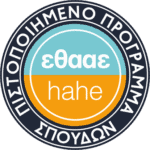Διάλεξη του Colin G. King, Αναπληρωτή Καθηγητή Φιλοσοφίας (Providence College)
ΠΡΟΣΚΛΗΣΗ
Το Κέντρον Ερεύνης της Ελληνικής Φιλοσοφίας της Ακαδημίας Αθηνών
σας προσκαλεί στο πλαίσιο του Μηνιαίου Σεμιναρίου Φιλοσοφίας
στη διάλεξη του Colin G. King, Αναπληρωτή Καθηγητή Φιλοσοφίας (Providence College),
που θα διεξαχθεί παρουσία του ομιλητή
στη Φιλοσοφική Βιβλιοθήκη “Έλλη Λαμπρίδη” (Υψηλάντου 9, Αθήνα),
την Τετάρτη 29 Μαΐου 2024, 16:00-18:00.
Θέμα: “Idealizing language in Aristotle’s logic”.
Το Σεμινάριο θα προβληθεί και διαδικτυακά
στον ακόλουθο σύνδεσμο Zoom:
https://us06web.zoom.us/j/9147464241?pwd=Tyt3VGIrS3FFN1h6UVZIVmRjbEdYZz09
Meeting ID: 914 746 4241
Passcode: 621567
———————————————
INVITATION
The Research Centre for Greek Philosophy at the Academy of Athens
Invites you in the course of the Monthly Philosophy Seminar
to the lecture by Colin G. King, Associate Professor of Philosophy (Providence College),
which will be held in the presence of the speaker
on Wednesday 29 May 2024, 16:00-20:00 (ATH, GR time zone)
at the “Elli Lambridis” Philosophical Library (9 Hypsilantou str., Athens).
Topic: “Idealising language in Aristotle’s logic”.
The Seminar will be broadcast live via Zoom
at the following link:
https://us06web.zoom.us/j/9147464241?pwd=Tyt3VGIrS3FFN1h6UVZIVmRjbEdYZz09
Meeting ID: 914 746 4241
Passcode: 621567
Abstract
Aristotle does not avail himself of the distinction between object and meta-language (Mignucci 1988, pace e.g. Sainati 1968, Corcoran 1974, Boger 2022) nor did he construct in his syllogistic a formalized language (Morison 2011, pace Smiley 1982). Aristotle’s logical theory and his reflection on that theory are nestled side-by-side in his native Greek — be it the syllogistic or the localized theses and observations contained in the τόποι of the Topics. But even if Aristotle lacked the notion of a meta-language and related theoretical resources, such as a theory of use and mention, he clearly had the means to talk about language and use those reflections for logical theorizing. The question which I seek to address here concerns how he does this. I survey the ways in which Aristotle manages to reflect on logical features of (ordinary) language within ordinary language, i.e. without the means of putting up a system in artificial language and then reflecting on it. The primary locus for Aristotle’s logical theorizing are the Analytics, so we will begin with them. Then I shall consider some approaches to language in the Topics, in particular the way in which the predicables serve to classify the possible contents of utterances in dialectical contexts. The thesis is contained in the title: Aristotle abstracts features of normal language as models or ideal types, using these both for logical purposes and in order to expand from them to observations about more complex linguistic phenomena. I hasten to add that I do not wish to imply that this idealizing has any sort of idealist implications. Aristotle attempts to make ordinary language tractable for logical theorizing in both the Analytics and the Topics through extracting simplified models of propositions and ideal types of predications, but in each case in interestingly different ways which shed light on the different natures of these forays into logical theory.

